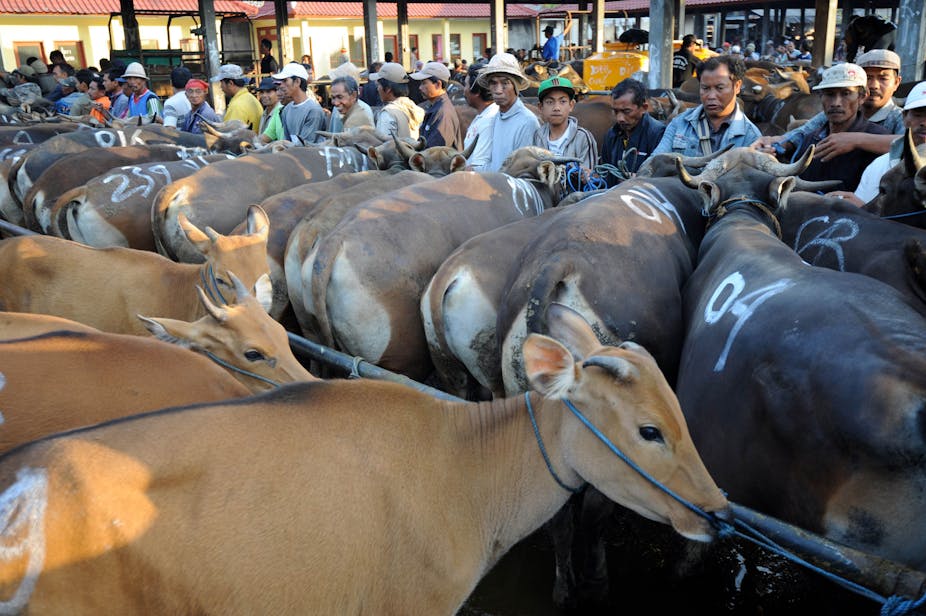We need to learn more about the countries we are exporting livestock to, or swapping refugees with. Two recent publicly-funded television documentaries have revealed just how little most Australians know about their northern neighbours.
The first was an investigative report by the ABC’s Four Corners exposing the mistreatment of Australian cattle in Indonesian abattoirs. The footage and public outrage convinced the Minister for Agriculture to ban all live cattle trade with Indonesia.
Many responses in Australia to the dispute showed little understanding for Indonesian life. Some argued that we should only send refrigerated meat to Indonesia, when many Indonesians do not have refrigerators. Others insisted humane killing of livestock is not part of Indonesian culture, when actually the halal method of slaughtering of animals by one quick cut to the throat has long been a part of Islamic culture adopted by Indonesians.
The Australian live cattle trade with Indonesia is worth $300 million per year. Why then, after ten years, are some Australian training programs to abattoirs in Indonesia only just being implemented? Where are the established structures and regular dialogue beyond the ministers to quickly and effectively find solutions to this problem?
Political rhetoric
And our politicians don’t help. They may speak of a “close relationship” with Indonesia, although every Australian prime minister since Gough Whitlam has made similar statements.
The Rudd government maintained over seventy ministerial visits between the Australia and Indonesia, and claimed that our “relationship status” was not just one of friends, but “strategic partners”.
The Leader of the Opposition’s response to this current dispute is to state that he and the Prime Minister need to travel to Indonesia immediately. But this issue is complex and cannot be solved by a diplomatic reception. The real test is the willingness and ability of our leaders to create greater personal connections outside their ministerial circle.
The 2011 Lowy Institute Poll concluded that Australian attitudes towards Indonesia “remain mired in distrust and suspicion”. As the survey states, Department of Foreign Affairs and Trade believes that the relationship has never been stronger. But no progress has been made convincing Australians to look more positively at Indonesia, as “results were virtually unchanged since these questions were last asked in 2006”. More Australians surveyed still claim that Indonesia is “a military threat”, rather than “an emerging democracy”.
A few more Indonesian-speaking Australians on the ground, working with our neighbours, might help. They could reduce the cultural gap and convince many Indonesians that stunning cattle is acceptable.
Lack of knowledge
The study of Asian languages and cultures has long been in decline in Australia. Finding young people to choose this as a career path is difficult if their craft is not valued.
The continual DFAT Level 4 warning to “Reconsider your need to travel” to Indonesia doesn’t help. What is stated as “travel advice” becomes public policy, so Indonesia is disregarded as a place to establish and maintain people-to-people linkages, particularly by the education sector.
Shock at refugee conditions
The second show was more reality television than documentary. SBS’s Go Back To Where You Came From also made headlines as the number one topic on Twitter when the first episode went to air. It asked six Australians to travel to regions where the refugees had once fled. The program highlighted how we often make judgements about asylum seekers, refugees and “boat people” without considering all the details of their plight.
The participants travelled to Malaysia, admitting beforehand that the country was an “unknown quantity” and they had “no idea about the culture”. One participant was filmed expressing surprise that so many Malaysian women were wearing, in her words, “a tea towel”. All were shocked at the poverty and desperation of the asylum seekers who live there.
The show suggested that greater knowledge and understanding of the developing world, including Asia, might mean a more considerate, compassionate and worldly Australian society.
Be a better neighbour
One way to do this would be to increase our knowledge of cultures and societies of developing countries. Why not start with those developing nations right on our doorstep?
Put simply, let’s engage more with the countries to which we are exporting livestock to, or swapping refugees with.
Australia’s trade, security, population and society is inextricably linked our Asian neighbours. If only we put more effort into developing educational programs and people-to-people links beyond our ministers.
We might then have a better idea of how to address issues involving these countries in the future.

